
 |
||||||
|
GAY
FILM REVIEWS BY MICHAEL D. KLEMM
|
||||||
|
We
Were One Man 1980 Director/Screenplay: Starring: Serge Avedikian, Piotr Stanislas, Catherine Albin, Lucien Guerin Unrated, 90 minutes
Wild
Reeds Director:: Screenplay: Starring: Elodie Bouchez, Gael Morel, Stephane Rideau, Frederic Gorny, Michele Moretti, Jacques Nolot Unrated, 110 minutes |
Life
During Wartime
Wartime brings out the best and the worst in people. Alliances are often formed however in the unlikeliest of places...even queer ones. We Were One Man, and the critically acclaimed Wild Reeds, are two exceptional French films which both explore the consequences of male love during seasons of great crisis. |
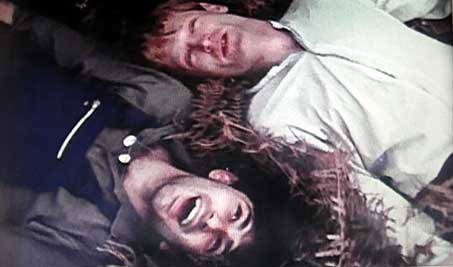 |
|
|
We Were One Man (1980) is an offbeat love story written and directed by Philippe Vallois. The year is 1943 and World War II rages on. A young peasant named Guy lives in an abandoned farmhouse on the outskirts of a French village and longs for a friend to share his loneliness. His wish is granted one day when he finds Rolf, a wounded German soldier, in the woods. Guy takes him back home and nurses him back to health. For reasons unclear in the beginning, (except to a gay audience), Rolf remains at the cottage and does not want to return to his troops. He realizes that he is developing feelings for his savior. |
|
|
|
|
|
|
|
|
|
|
|
|
|
|
We Were One Man is a very European film in structure and mood, overwhelmed with details too plentiful to digest in a single viewing. But I have to be honest and report that it is awkwardly photographed and edited in spots, and the music is sometimes obtrusive and doesn't fit the action. What it may lack in studio polish, however, it more than makes up with fine acting and characterizations. |
|
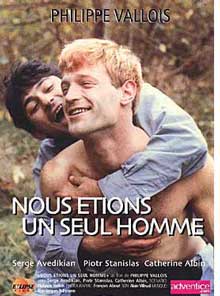 [Reviewer's
update 2009: It's been over a decade since I last saw this film. I hadn't
even thought about it until last year, when I watched and reviewed Johan:
Mon ete 75, and discovered that both films were directed by the
same man. I had no way of seeing We Were One
Man again because the movie was out of print. I had rented
it, in 1999, on VHS from the much missed Rainbow Pride shop, which occupied
part of the equally missed Buffalo gay bar, Buddies. Frank Ball, the shop's
owner had a number of queer films that aren't currently available on DVD
(Together/Alone and I'll
Love You Forever...Tonight - also reprinted from Outcome
on this site - fall into this category too). I am thrilled to report that
Waterbearer Films has just released the film on DVD. [Reviewer's
update 2009: It's been over a decade since I last saw this film. I hadn't
even thought about it until last year, when I watched and reviewed Johan:
Mon ete 75, and discovered that both films were directed by the
same man. I had no way of seeing We Were One
Man again because the movie was out of print. I had rented
it, in 1999, on VHS from the much missed Rainbow Pride shop, which occupied
part of the equally missed Buffalo gay bar, Buddies. Frank Ball, the shop's
owner had a number of queer films that aren't currently available on DVD
(Together/Alone and I'll
Love You Forever...Tonight - also reprinted from Outcome
on this site - fall into this category too). I am thrilled to report that
Waterbearer Films has just released the film on DVD. |
|
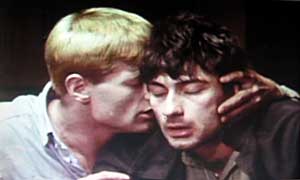 I
am amazed by how much of this film I had forgotten. In the original review,
I wrote that Guy's "behavior is certainly eccentric." That's putting it
mildly. I also have no idea why I wrote that he was a "harmless
buffoon." He seems that way at first (which might be why I wrote it that
way) but the man is certifiable! Guy is probably meant to represent
a metaphor for the war and if ever a film set out to show the madness of
war, this one is it. I
am amazed by how much of this film I had forgotten. In the original review,
I wrote that Guy's "behavior is certainly eccentric." That's putting it
mildly. I also have no idea why I wrote that he was a "harmless
buffoon." He seems that way at first (which might be why I wrote it that
way) but the man is certifiable! Guy is probably meant to represent
a metaphor for the war and if ever a film set out to show the madness of
war, this one is it. |
|
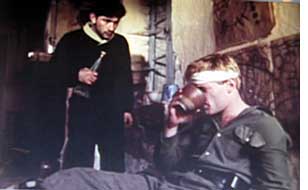 Like
Johan, this is an uneven film but its strengths almost cancel out
its weaknesses. There is nothing rational about the plot and yet our emotions
remain engaged. As far as character goes, these two guys are just a step
away from Shakespeare's Hamlet in that they share behavior that is so
unpredictable that it almost defies analysis. Guy is clearly insane
but why does Rolf keep returning to him again and again? This will either
intrigue, or irritate, viewers. Like
Johan, this is an uneven film but its strengths almost cancel out
its weaknesses. There is nothing rational about the plot and yet our emotions
remain engaged. As far as character goes, these two guys are just a step
away from Shakespeare's Hamlet in that they share behavior that is so
unpredictable that it almost defies analysis. Guy is clearly insane
but why does Rolf keep returning to him again and again? This will either
intrigue, or irritate, viewers. |
|
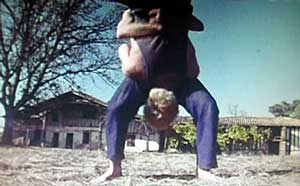 I
was reminded of another film that I reviewed last year, Chris Newby's 1996
Madagascar Skin. Both films shared a similar situation in which one
man rescues another and they reside together in a cottage rife with sexual
tension. The two men are constantly wrestling, fighting and playing like
children, and the film is a perpetual tease. Why does Guy lick Rolf's back
and then push the German away when he tries to kiss him? You sit there,
thinking: Are these guys going to go for it or not? When they finally do,
it is one of the most intense scenes of raw animal passion between two men
that this reviewer has ever seen. Remember too that this filmed thirty
years ago! I
was reminded of another film that I reviewed last year, Chris Newby's 1996
Madagascar Skin. Both films shared a similar situation in which one
man rescues another and they reside together in a cottage rife with sexual
tension. The two men are constantly wrestling, fighting and playing like
children, and the film is a perpetual tease. Why does Guy lick Rolf's back
and then push the German away when he tries to kiss him? You sit there,
thinking: Are these guys going to go for it or not? When they finally do,
it is one of the most intense scenes of raw animal passion between two men
that this reviewer has ever seen. Remember too that this filmed thirty
years ago! |
|
|
More
On Philippe Vallois:
|
|
|
To Francois' surprise, Serge seeks out his friendship in order to better his grades. He also says they can help each other get girls because they are both opposites. Francois at first refuses. Then, in a very telling visual moment, Serge shoves some test answers into the front of his trousers. Francois suddenly unbuttons the bottom of Serge's shirt and pulls the answers out of his pants. Henri walks in on the two boys after they have traded test answers in the lavatory and accuses Francois of fornicating with Serge in the toilet. "I understand," he says, "At your age I was the same way. Why deprive yourself of life's pleasures?" That night, Serge sits down on Francois' bed to inquire if he ever masturbates and then asks if he would like to do it with him. After a few minutes, Francois puts his arm around Serge and the two boys make love. It is one of the gentlest moments of young love and affection ever filmed.
Adolescence with its onset of adult hormones can be the most confusing time in a person's life. The confusion here is compounded by the war in Algiers, which affects all of them in various ways. Maite's mother is a teacher at the boys' school and she refused to help Serge's older brother desert from the army. When he is killed in the war, she suffers a nervous breakdown. His brother's death causes Serge to feel hostile to the orphaned Henri, an Algerian sympathizer. Francois, however, is drawn to Henri, even though the rest of the boys in the school shun him.
The film's title comes from The Oak and the Reed, a fable by La Fontaine that is the subject of a classroom lesson. In the fable, the oak tells the reed that "nature did you wrong" and boasts of its strength while the reed insists that it "fear[s] not the wind, I bend without breaking." The tree is uprooted in a storm while the reed remains standing. The main characters can be seen as being reeds themselves, wild and undisciplined, but resilient and able to weather both the political and sexual storms around them.
Each of the principals is a uniquely developed persona brought fully to life by a terrific and natural ensemble of young actors. Unlike many American films that deal with teen-agers, the teachers and adults are also rendered with care, rather than being mere cartoons. To the film's credit, Techine does not try to wrap everything up in a neat and contrived bundle at the end. It is a warm and very likable (and partially autobiographical) tale that can stand with the best of Truffaut and Renoir. Both films are in French with subtitles and, due to their subject matter, are definitely not Blockbuster fodder. I rented both videos at Rainbow Pride located inside Buddies at 31 Johnson Park.
More
On Andre Techine: More
On Gael Morel and Stephane Rideau: More On Stephane
Rideau:
|
|
|